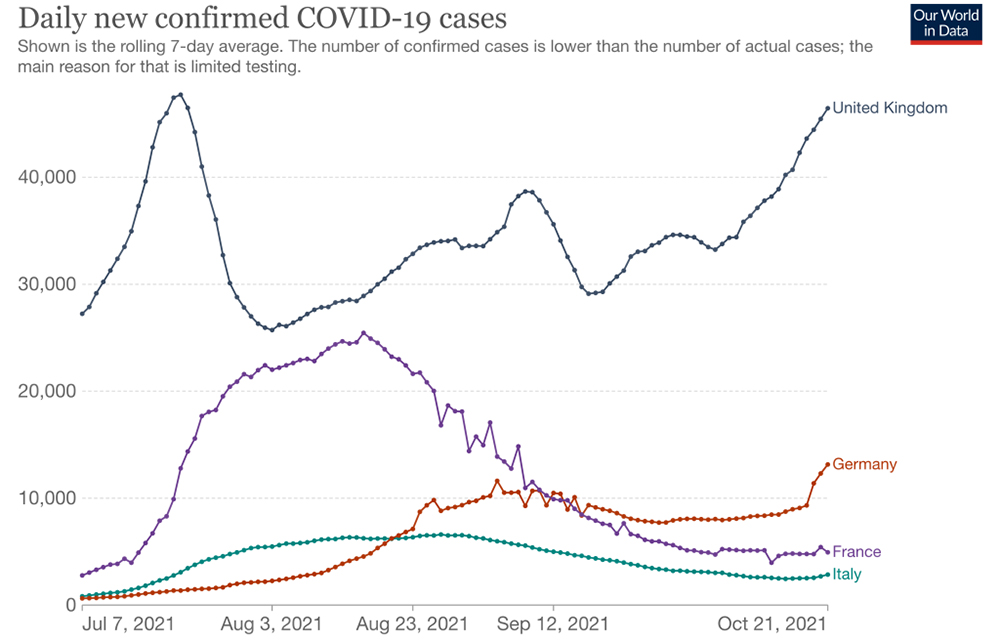新冠疫苗的保护力减弱后会怎样?看看英国就知道了
2020年12月,英国成为全球第一个接种新冠肺炎疫苗的国家。这种先发优势现在看起来却更像是一种不利因素,因为首批新冠疫苗的效力似乎正在逐渐减弱,新冠肺炎病例再次激增。
10月21日,英国的新冠肺炎确诊病例三个月来首次超过5万人,死亡人数达到115人。该国的公共卫生官员警告称,新冠疫苗的保护力已经开始下降,英国人预计又将面临一个严冬。眼下,医生们正在公开呼吁重新采取防控措施。但政客们却铁了心维持经济完全开放。
因为英国一早就成功完成了新冠疫苗的接种,英国首相鲍里斯·约翰逊因此受到鼓舞,把所有希望都寄托在一堵“免疫墙”能够把病毒拒之门外。但面对传染性极高的德尔塔变种毒株,群体免疫被证明是靠不住的。
以色列是另外一个一早就开始接种新冠疫苗的国家,该国自7月1日起开始为60岁以上的人注射新冠疫苗加强针,原因是全国各地的新冠肺炎病例都开始增多。在此之后,以色列的新冠肺炎病例数再次下降,从而避免了一场更大的公共卫生危机。这进一步表明,对全球各大经济体而言,新冠疫苗加强针将是今冬的重要防线。正如贝伦伯格(Berenberg)的经济学家霍尔格·施米丁在最近的一份投资者报告中所说:“随着时间的推移,新冠疫苗的保护作用逐渐减弱,接种新冠疫苗加强针可以起到决定性作用。”
但英国与以色列不同之处在于,以色列有严格的新冠疫苗护照和公共场所戴口罩的政策,英国却没有这样的限制,在为易感群体注射新冠疫苗加强针这一点上也后知后觉。英国医学协会称政府的不作为“令人极度担心”。
“政府已经松开了刹车,给人一种新冠疫情已经结束了的印象。”英国医学协会的理事会主席查恩德·纳格保罗说,但现实是如今的“感染率、住院率和死亡率都高得不可接受,这样的数字在情况相近的欧洲国家闻所未闻。”

英国 德国 法国 意大利
2021年7月7日 2021年8月3日 2021年8月23日 2021年9月12日 2021年10月21日
资料来源:Johns Hopkins University CSSE COVID-19 Data
与众不同的英国
自今年7月19日以来,英国人就无须遵守任何新冠肺炎疫情管控措施了。也就是说,地铁上不用戴口罩,无论新冠疫苗的接种情况如何,学校里的所有人都在一起活动,餐馆、酒吧和夜总会不进行任何客流限制。这和你在邻国法国和意大利看到的情况大不相同。在法国和意大利,工作人员进入工作场所必须出示新冠疫苗接种证明或核酸阴性检测结果,想进酒吧或餐厅也一样。
英国官员叹息道,政策越宽松,新冠肺炎病例不可避免地就会更多。根据英国公共卫生部门(Public Health England)的数据,英国在10月22日有5.2万例新增病例,远远超过欧洲其他国家。
英国对新冠肺炎疫情的处理甚至让一贯刻板的意大利总理马里奥·德拉吉挖苦英国为反面教材。据彭博社报道,德拉吉在10月20日向意大利议会下院表示:“英国是最早最快开展新冠疫苗接种的国家之一,但在他们全面放开防疫政策之后,现在每天新增5万病例,昨天死亡200人。”
因此,全英医生都在呼吁采取“B计划”应对新冠肺炎疫情——重新要求保持社交距离、佩戴口罩,要求提供新冠疫苗接种证明。尽管英国科学家大声疾呼,政府却坚决拒绝采纳。随着冬天即将到来,英国政府孤注一掷,准备加速推进新冠疫苗接种。
尽管因为接种新冠疫苗降低了罹患重症的风险,死亡率仍然很低成了唯一可取之处,但10月中旬的住院病例数增加了10%。
“从我们开始接种新冠疫苗已经差不多一年了,需要重新评估新冠疫苗的效力。”伯明翰大学的免疫学和免疫治疗研究所的教授保罗·莫斯说。他特别指出,英国现在的情况是,完成两针注射后发展出的抗体已经“开始减弱了”。
就连贝伦贝格的经济学家也对这种趋势感到不安。他们撰写的报告的标题是:“英国要面临新一轮的病例增长了吗?”(财富中文网)
译者:Agatha
2020年12月,英国成为全球第一个接种新冠肺炎疫苗的国家。这种先发优势现在看起来却更像是一种不利因素,因为首批新冠疫苗的效力似乎正在逐渐减弱,新冠肺炎病例再次激增。
10月21日,英国的新冠肺炎确诊病例三个月来首次超过5万人,死亡人数达到115人。该国的公共卫生官员警告称,新冠疫苗的保护力已经开始下降,英国人预计又将面临一个严冬。眼下,医生们正在公开呼吁重新采取防控措施。但政客们却铁了心维持经济完全开放。
因为英国一早就成功完成了新冠疫苗的接种,英国首相鲍里斯·约翰逊因此受到鼓舞,把所有希望都寄托在一堵“免疫墙”能够把病毒拒之门外。但面对传染性极高的德尔塔变种毒株,群体免疫被证明是靠不住的。
以色列是另外一个一早就开始接种新冠疫苗的国家,该国自7月1日起开始为60岁以上的人注射新冠疫苗加强针,原因是全国各地的新冠肺炎病例都开始增多。在此之后,以色列的新冠肺炎病例数再次下降,从而避免了一场更大的公共卫生危机。这进一步表明,对全球各大经济体而言,新冠疫苗加强针将是今冬的重要防线。正如贝伦伯格(Berenberg)的经济学家霍尔格·施米丁在最近的一份投资者报告中所说:“随着时间的推移,新冠疫苗的保护作用逐渐减弱,接种新冠疫苗加强针可以起到决定性作用。”
但英国与以色列不同之处在于,以色列有严格的新冠疫苗护照和公共场所戴口罩的政策,英国却没有这样的限制,在为易感群体注射新冠疫苗加强针这一点上也后知后觉。英国医学协会称政府的不作为“令人极度担心”。
“政府已经松开了刹车,给人一种新冠疫情已经结束了的印象。”英国医学协会的理事会主席查恩德·纳格保罗说,但现实是如今的“感染率、住院率和死亡率都高得不可接受,这样的数字在情况相近的欧洲国家闻所未闻。”
每日新增新冠肺炎病例确诊数量
英国 德国 法国 意大利
2021年7月7日 2021年8月3日 2021年8月23日 2021年9月12日 2021年10月21日
资料来源:Johns Hopkins University CSSE COVID-19 Data
与众不同的英国
自今年7月19日以来,英国人就无须遵守任何新冠肺炎疫情管控措施了。也就是说,地铁上不用戴口罩,无论新冠疫苗的接种情况如何,学校里的所有人都在一起活动,餐馆、酒吧和夜总会不进行任何客流限制。这和你在邻国法国和意大利看到的情况大不相同。在法国和意大利,工作人员进入工作场所必须出示新冠疫苗接种证明或核酸阴性检测结果,想进酒吧或餐厅也一样。
英国官员叹息道,政策越宽松,新冠肺炎病例不可避免地就会更多。根据英国公共卫生部门(Public Health England)的数据,英国在10月22日有5.2万例新增病例,远远超过欧洲其他国家。
英国对新冠肺炎疫情的处理甚至让一贯刻板的意大利总理马里奥·德拉吉挖苦英国为反面教材。据彭博社报道,德拉吉在10月20日向意大利议会下院表示:“英国是最早最快开展新冠疫苗接种的国家之一,但在他们全面放开防疫政策之后,现在每天新增5万病例,昨天死亡200人。”
因此,全英医生都在呼吁采取“B计划”应对新冠肺炎疫情——重新要求保持社交距离、佩戴口罩,要求提供新冠疫苗接种证明。尽管英国科学家大声疾呼,政府却坚决拒绝采纳。随着冬天即将到来,英国政府孤注一掷,准备加速推进新冠疫苗接种。
尽管因为接种新冠疫苗降低了罹患重症的风险,死亡率仍然很低成了唯一可取之处,但10月中旬的住院病例数增加了10%。
“从我们开始接种新冠疫苗已经差不多一年了,需要重新评估新冠疫苗的效力。”伯明翰大学的免疫学和免疫治疗研究所的教授保罗·莫斯说。他特别指出,英国现在的情况是,完成两针注射后发展出的抗体已经“开始减弱了”。
就连贝伦贝格的经济学家也对这种趋势感到不安。他们撰写的报告的标题是:“英国要面临新一轮的病例增长了吗?”(财富中文网)
译者:Agatha
Last December, the United Kingdom became the first country to administer COVID-19 vaccines. That first-mover advantage is looking more like a liability right now as the effectiveness of that initial batch of doses appears to wear down, and cases spike again.
On October 21, COVID cases topped 50,000 for the first time in the past three months, and deaths reached 115. Under that backdrop, Britain's public health officials are warning that vaccine immunity has begun to decline, predicting the country is headed for another harsh winter. Now doctors are openly calling for new restrictions on the public. Politicians, meanwhile, are determined to keep the economy fully open.
Buoyed by the success of the early vaccine rollout, U.K. Prime Minister Boris Johnson had put all his hope in a kind of “wall of immunity” keeping the virus at bay. But faced with the highly transmissible Delta variant, herd immunity proved dubious at best.
Israel, another early vaccine-mover, started to offer booster shots to people over 60 from July 1, as the number of cases started to increase across the country. Case numbers there then subsided, and a larger public health crisis was averted, further indication that boosters will be an important line of defense for the world's biggest economies this winter. As Berenberg economist Holger Schmieding said in a recent investor note, “The vaccine protection becomes less effective over time, and booster jabs can make a decisive difference.”
But unlike Israel, which has strict vaccine passport and public-masking policies in place, the U.K. has no such restrictions. It's also behind the curve in providing booster shots to vulnerable Britons. The British Medical Association has called government inaction “incredibly concerning.”
“The government has taken its foot off the brake, giving the impression that the pandemic is behind us,” BMA council chair Chaand Nagpaul said, calling the reality today an “unacceptable rate of infections, hospitalizations, and deaths, unheard-of in similar European nations.”
Excluded Britain
Since July 19, there have been no COVID-19 restrictions in place for Britons. That means no mask on the subway, complete mixing at schools regardless of vaccination status, and unlimited capacity at restaurants, pubs, and nightclubs. It's a far cry from what you see in neighboring France and Italy, where workers are required to show proof of vaccination or a recent negative test to enter a workplace, as are diners wishing to enter a bar or restaurant.
This more lax style has inevitably led to more cases, U.K. officials lament. According to Public Health England, the 52,000 new infections reported on October 22 put Britain far above the rest of Europe.
Britain's handling of the epidemic even led the normally straitlaced Italian Prime Minister Mario Draghi to take a dig at the U.K. as an example of what countries should not do. “The U.K., one of the countries that conducted its vaccination campaign with great speed, after abandoning all caution, today has around 50,000 daily new cases and 200 dead yesterday,” Bloomberg reported Draghi said on October 20 to Italy’s lower house of Parliament.
This has prompted doctors from across the U.K. to call for a “plan B” coronavirus response—reintroducing social distancing measures, mask mandates, and requiring proof of vaccination. Despite the urgent calls from U.K. scientists, the government firmly rejected the suggestions. Instead, it will throw its lot behind doubling down on vaccines as it heads into winter.
And while the saving grace was that deaths were still low, as vaccinations make it much safer to contract COVID-19, hospitalizations have gone up by 10% in mid-October.
“It’s about one year since we had the vaccine, and it’s time to reappraise what they have achieved,” says Paul Moss, a professor at the University of Birmingham’s Institute of Immunology and Immunotherapy, noting the U.K. is now seeing antibody levels that developed after the second vaccine “beginning to wane.”
Even the economists at Berenberg are wondering how this will trend. The report carried a headline: “Another uptick in the U.K. now?”













